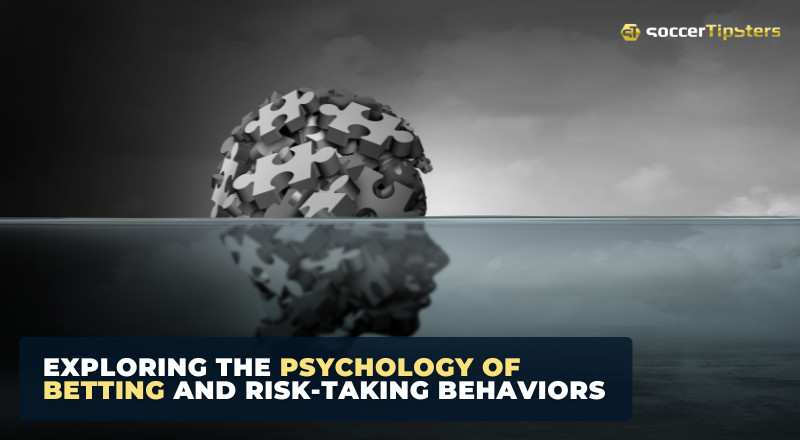- September 26,2024
- -
- Asher K
Exploring The Psychology Of Betting And Risk-Taking Behaviors
Gambling through betting has existed for centuries across various cultures, driven by human psychology and emotions. With the rise of online sports betting, casinos, poker, and other digital gambling activities into a nearly 500 billion dollar global industry, understanding the psychology behind wagering and risk-taking has become increasingly relevant. Leveraging behavioral research provides unique insights for players and industry stakeholders seeking sustainable engagement. This deep dive explores psychological factors that influence individual bettors, analysis of potential risks, and tips for optimizing success while betting responsibly.
Key Drivers Behind Betting Psychology
Several established concepts help explain what motivates people to engage in betting behaviors spanning casual entertainment to harmful addiction:
-
Variable Reward System - Winning money through skilled chance provides satisfaction by activating reward circuits in the brain fueled by the neurotransmitter dopamine. This reaction can become addictive over time.
-
Cognitive Biases - Logical fallacies like confirmation bias or the gambler’s fallacy distort perceived skill or control over outcomes. Bettors remember wins more than losses and struggle to assess risk objectively.
-
Ego and Social Drivers - Betting allows demonstrating knowledge, achievement, or status across friend groups and society for an ego boost. Some derive identity from gambling prowess.
-
Escape and Coping - For some bettors, wagering provides a distraction or escape from real-life stresses. The activity becomes a maladaptive coping mechanism to avoid issues.
Understanding Problem Gambling And Addiction
While the majority engage responsibly for entertainment, certain risk factors make some more prone to destructive addiction fueled by the drivers above:
-
Impulsivity - Quick decision-making without considering long-term consequences makes breaking habits challenging
-
Competitiveness - Aggressive personalities fixate on winning at all costs rather than rationally balancing risk and money management
-
Narcissism - Inflated self-views lead to denial about harm from excessive gambling despite the consequences
-
Early Big Wins - Quick wins when starting betting reinforce dopamine rushes but are hard to recreate long-term
-
Environmental Factors - Having heavy exposure to gambling from a young age tends to normalize harmful behavior.
-
Depression/Anxiety - Pre-existing mental health conditions, especially tied to finances, make escapism more challenging to manage.
Tips For Betting Responsibly And Optimizing Outcomes
Embracing perspective allows enjoying gambling as entertainment rather than a financial strategy:
-
Set clearly defined loss limits aligned to entertainment budgets
-
View losses as the cost of a recreational experience
-
Avoid chasing by walking away when daily limits hit
-
Understand odds/projections have house advantages calculated in
It also helps cultivate meta-cognition by separating intuitive impulses from rational choices:
-
Identify cognitive bias tendencies through reflection
-
Assess decisions critically rather than trust instincts
-
Focus bankroll growth on long-term positive expectancy
-
Commit to stop-loss strategies protecting bankrolls
Being mindful of motivation creates space to assess whether gambling stops being a light-hearted diversion:
-
Honestly evaluate if enjoyment comes from the activity itself
-
Monitor ego and status associations with winning/losing
-
Notice when mood becomes tied to financial results
-
Commit to sustainable, rational choices that serve you
Conclusion
Understanding the complex psychology involved with betting provides unique insights for players and industry stakeholders. By studying behavioral concepts around reward systems, cognitive biases, and emotional motivations, individuals can better assess their own habits, and operators can build safer gambling environments.
While most bettors engage casually as a recreational activity, risk factors exist that require vigilance. Setting deposit limits, walking away when annoyed or anxious, and being honest about motivation allow us to uphold responsibility. If struggles emerge, various support resources provide help getting back on track.
Approaching betting from an informed, intentional state fueled by self-awareness helps optimize success and enjoyment over the long run. Keeping perspective on the activity as an entertainment experience rather than a potential income stream or self-worth gauge grounds decisions and expectations. By leveraging lessons from behavioral research, bettors equip themselves to participate sustainably.
- Sports Industry Preview
- Soccer League Preview
- Profitable Trends
- Betting Guide
- Betting Help
- Betting Strategy
- Betting System
- Sports Betting
- World Cup
- Betting Tipsters
- Betting Bankroll
- Transfer Window
- Premier League
- Match Reviews
- Footballer Reviews
- Betting Predictions
- Club Reviews
- Manager Reviews
- Betting Odds
- Promotion Reviews
- Betting Trends
- Soccer Betting Tips Video Series
- English Football
- eSports
- Arsenal
- Borussia Dortmund
- Inter milan
- Betting Tips
- World Cup 2018
- Russia
- Italy
- Betting Expert
- Cristiano Ronaldo
- Lionel Messi
- Real Madrid
- France
- Belgium
- Brazil
- Germany
- Paul Pogba
- Marcos Ao??s Corr??a
- Timo Werner
- Aleksandr Golovin
- Sergej Milinkovic-Savic
- Alireza Jahanbakhsh
- Pione Sisto
- Denis Zakaria
- Soccer Tipsters
- Manchester United
- Hull City
- Abou Diaby
- Luc Nilis
- David Busst
- Ryan Mason
- English Premier League
- Middlesbrough F.C.
- Norwich City F.C.
- Sheffield Wednesday F.C.
- Bet Strategy
- Mix Parlay
- AS Monaco FC
- Goal Scoring Trends
- French Ligue 1
- Stade Malherbe Caen
- Stade Rennais F.C.
- Scottish Premier League
- Hibernian F.C.
- Dundee F.C.
- Kilmarnock F.C.
- Celtic F.C.
- Aberdeen F.C.
- Rangers F.C.
- Premier League
- Manchester City
- Barcelona
- FC Bayern Munich
- Carabao Cup
- Real Sociedad
- La Liga
- CD Legan??s
- Deportivo de La Coru?a
- Harry Kane
- England
- Steven Gerrard
- Juventus
- Mohamed Elyounoussi
- Danny Welbeck
- Mattia De Sciglio
- Viniciul Junior
- Flamengo
- Jose Mourinho
- Sir Alex Ferguson
- Chelsea
- Eden Hazard
- Jorginho
- Croatia
- Professional Punters
- Soccer betting tips
- Value Bets
- Betting Odds
- Mark Hughes
- Sportsbook
- Points per game
- PPG
- PPG statistics
- A.S. Roma
- Arsenal F.C.
- Tottenham Hotspur F.C.
- Liverpool F.C.
- Everton F.C.
- FK Partizan
- FK Crvena zvezda
- FC Schalke 04
- A.C. Milan
- Club Atl??tico River Plate
- Derby Della Capitale
- North London Derby
- Merseyside derby
- Eternal Derby
- Ruhr Derby
- Derby della Madonnina
- Superclasico
- World Cup 1998
- Japan
- Colombia
- Denmark
- Euro 2016
- Moscow
- Kaliningrad
- Saint Petersburg
- Nizhny Novgorod
- FC Basel
- Newspaper Betting Tipsters
- Television Betting Tipsters
- Radio Betting Tipsters
- Internet Betting Tipsters
- Soccer Betting Bankroll
- Soccer Betting Expert
- Pierre-Erick Aubameyang
- Fantasy Premier League
- Marko Arnautovic
- Wilfred Zaha
- Chris Wood
- Kyle Walker
- Cezar Azpilicueta
- Seamus Coleman
- Trent Alexander-Arnold
- Sol Bamba
- Leon Goretzka
- Jose Gimenez
- Max Meyer
- Jurgen Klopp
- Stoke City
- Coventry City F.C.
- Bookies
- Bonuses
- Alisson Becker
- Eliquim Mangala
- Anthony Martial
- Luke Shaw
- Toby Alderweireld
- Cesc Fabregas
- Ander Herrera
- Oliver Giroud
- Atletico Madrid
- Sevilla FC
- Ronaldo
- Van Nistelrooy
- Sunderland A.F.C.
- Betting Accumulators
- Mohamed Salah
- Indian Super League
- Pep Guardiola
- Livescores
- Golden Generation
- World Cup 2006
- SSC Napoli
- David De Gea
- Nick Pope
- Allison Becker
- Lukasz Fabianski
- Hugo Lloris
- Ederson Moraes
- VAR
- Dirk Kuyt
- Diego Milito
- Park Ji-Sung
- Thomas Muller
- Soccer Betting Facts
- 1X2
- Handicap Betting
- Total Goals
- SoccerTipsters
- Free Soccer Predictions
- Live Betting
- Bookmaker
- World Cup
- Qatar 2022
- PSG
- Ngolo Kante
- Claude Makelele
- American Football
- E-Sports
- Kathmandu Stadium
- Hillsborough
- CTE
- Chronic Traumatic Encephalopathy
- FIFA
- European Super League
- UEFA
- Neymar
- Professional Footballer
- EPL
- Christian Pulisic
- Lance Armstrong
- Tonya Harding
- Black Sox
- Match Fixing
- Calciopoli
- Formula One Spygate
- Women World Cup
- Series A
- Georgio Chiellini
- Fiorentina
- Bundesliga
- European Handicaps
- Accumulator Bets
- Parlays
- Arbitrage Betting
- Progressive Betting
- Martingale
- Oscar's grind
- Paroli System
- Martindale System
- David Moyes
- Southampton
- Betting Blog
- FA Cup
- SPAL
- Sampdoria
- RB Leipzig
- Champions League
- Betting On Soccer
- Casino Betting
- Teaser Bet
- Betting Bankroll
- Kelly Criterion
- In Play Betting
- Hedging
- Betting Market
- Matched Betting
- Betting Exchange
- Labouchere
- Serie B
- Crotone
- Italy Serie B
- Serie C
- Simeon Nwankwo
- Cittadella
- Liverpool
- UEFA Champions League
- Match predictions
- Paris Saint-Germain
- Atalanta
- Valencia
- Serie A
- Staking method
- Proportional Betting
- Martingale System
- Fibonacci System
- Arbitrage
- Underdogs
- Betting On Underdogs
- Beat The Bookies
- soccer betting
- Spread Betting
- Opening Odds
- Closing Odds
- Sports Betting Addiction
- Betting Disorder
- Sports Betting in Indonesia
- Indonesia
- Betting On Sports
- Sports Betting in Malaysia
- Ascot Sports
- Betting Guide
- Indo Odds
- Sports Betting In Thailand
- Thailand Sportsbook
- Thailand Casinos
- Asian Bookies
- In-play Betting
- Over/Under
- betting system
- Europa league
- Leicester City
- Benevento Calcio
- Olympics
- Euro Cup
- America Cup
- betting trends
- BTTS
- Villarreal CF
- Betting on Casino
- Casino
- House Edge
- bankroll
- bankroll management
- Betting Bankroll Management
- Coronavirus
- Betting Value
- Asian Handicap
- Parlay
- Betting Probability
- betting on draw
- soccer leagues
- Draw Bets
- Egyptian Premier League
- French Ligue 2
- English League Two
- Correct Score
- Double Chance
- Fixed Odds
- Sportsbook Review
- Bet365
- Statistical Trends
- Marcus Rashford
- Alexandre Lacazette
- Son Heung-Min
- Calvert-Lewin
- Richarlison
- bookmakers
- IMSports
- IMesports
- Betting strategies
- Betting Algorithm
- Invictus
- Accumulator Generator
- Betegy
- AFC Champions League
- Asian Football Champions League
- Galatasaray
- Turkey Super League
- Istanbul Basaksehir
- Trabzonspor
- tipsters
- Smart Punter
- UEFA Euro 2020
- FC Barcelona
- Barça
- Takefusa Kubo
- Hwang Hee-chan
- Takumi Minamino
- Sardar Azmoun
- Erling Haaland
- Jadon Sancho
- Ansu Fati
- Alphonso Davies
- Vinícius Júnior
- Erling Braut Haaland
- Pierre-Emerick Aubameyang
- German Super Cup
- French League Cup
- Constant Kelly
- Football Betting Tips
- Sports Betting Trading
- mathematical expectation
- expected value
- Asian Football Leagues
- Chinese Super League
- K League
- Bet On Corners
- Double Chance Betting
- Sportsbooks
- Red devils
- Betting bonuses
- Rollover
- Welcome Bonuses
- Gerard Deulofeu
- EFL Championship
- Ismaïla Sarr
- Sbotop
- Sbotop Magazine
- Tottenham Hotspur
- Gareth Bale
- Superstitions
- MAXBET
- SBOBET
- M8bet
- Robert Lewandowski
- Odd And Even
- Pinnacle Sports
- Positive Progression
- Bettorclub
- Corner Kicks
- Sheffield United
- Luis Muriel
- Deportivo Cali
- Yankee Bet
- Trixie Combo Bet
- Underdogs Parlay
- Negative Progression
- d'Alembert
- Kevin De Bruyne
- Luka Modric
- Sergio Busquets
- Tony Cross
- Miralem Pjanic
- Frankie de Jong
- Casino games
- Online Slot
- Slot Machine
- RTP
- Romelu Lukaku
- Karim Benzema
- Wayne Rooney
- Derby County
- Dusan Vlahovic
- Vinicius Jr
- MLS
- New England Revolution
- Carles Gil
- Crystal Palace
- Conor Gallagher
- 3-Way Handicap
- Ferran Torres
- Xavi Hernández
- Gabriel Martinelli
- Transfer windows
- Kylian Mbappé
- Franck Kessié
- Ousmane Dembélé
- Paulo Dybala
- Sergio Aguero
- Independiente de Avellaneda
- Diego Maradona
- Luis Díaz
- Trent Alexander Arnold
- Bayern Munich
- Emile Smith Rowe
- Overwatch
- First Person Shooter
- eSports Betting
- Blackjack
- Insurance Bets
- Jude Bellingham
- Sadio Mané
- Jamal Musiala
- Goalkeepers
- Manuel Neuer
- Gianluigi Donnarumma
- Thibaut Courtois
- Nottigham Forest
- Gleison Bremer
- Torino FC
- Hajduk Split
- Torcida Split
- Bayern Leverkusen
- Frenkie de Jong
- Aurélien Tchouaméni
- Tiémoué Bakayoko
- Freiburg
- Nico Schlotterbeck
- Acca
- Betting Algorithms
- Algorithm
- Statistical Betting
- Return On Investment
- ROI
- Betting Markets
- Decimals Odds
- Fractions Odds
- Handicap Odds
- Accumulator Bet
- Relegation
- Both Teams To Score
- Head-To-Head
- Goals Scored
- Dutching
- Early Cashout
- Accumulator Betting
- Over 1.5 Goals
- Total Goal
- Betting Formula
- Decimal Odds
- Both Team To Score
- Underdog
- Goal Scorer System
- Scoreline Betting System
- Handicap Betting System
- Positive Progression System
- Betting Tipsters
- Sports Prediction
- CMD368
- Bookie
- Sports Bookie
- Tipster
- Betting Tipster
- Cover a Bet
- Bet Against Yourself
- Money Management Strategy
- Handicapping Skills
- Handicapping
- Heinz System
- Martingale Betting
- Round Robin
- 1-3-2-6 System
- D’Alembert System
- Predictions
- Betting Exchanges
- Soccer Betting Mistakes
- Betting Mistakes
- Statistical Analysis
- Team Statistics
- Betting Data And Stats
- Historical Results
- Data Driven Strategies
- Sports Analytics
- Analytics
- Sports Betting Analytics
- Betting Analytics
- Deciphering Betting Odds
- Comprehending Betting Odds
- Probability
- Fractional Odds
- Money Line
- Futures Bet
- Prop Bet
- Goliath Bet
- Data Analysis
- Statistics And Data Analysis
- Historical Performances
- Statistical Evaluations
- Betting Strategy
- Betting Model
- Moneyline
- Prop Bets
- Major League Soccer
- Data Management
- 1X On Home
- Fibonacci Strategy
- Martingale Strategy
- Historical Performance
- Sports Betting Misconceptions
- Sports Betting Myths
- Soccer Betting Strategy
- Mathematical
- Statistical Model
- Advanced Analytics
- Performance Indicators
- Predictive Models
- Expected Goals
- Performance Analysis
- Bankroll Goals
- Stop-Loss Strategies
- International Friendly
- Per 90s
- Shooting Percentage
- Ball Possession
- xGChain
- Value Bet
- Compare Odds
- Bet Tracking
- Identifying Trends
- Betting Patterns
- In-Play Bet
- Single Handicap
- Double Handicap
- Quarter Handicap
- Analyzing Statistics
- Historical Data
- Expert Tipster
- Betting Prediction
- Draw No Bet
- Draw Betting
- Data-Driven
- Prop Betting
- Corners
- Own Goal
- Losing Streaks
- Emotional Management
- Analytical Tools
- Fantasy Soccer
- Fantasy Sports
- American Odds
- Implied Probability
- Betting Portfolio
- Diversified Betting Portfolio
- Betting Yield
- Each Way Betting
- Time Management
- Successful Sports Betting
- Head-to-Head Betting
- Lay Betting
- Stacking Techniques
- Stacking
- Insurance Betting System
- Mathematical Betting
- Statistical Analysis And Distributions
- Regression Analysis
- Statistical Significance
- Probability Distributions
- Bayesian Network
- Poisson Distribution
- Binomial Distribution
- Hedge Betting
- Return to Player
- Malaysian Sports Betting
- Form And Statistics
- Leeds United
- Howard Wilkins
- Marco Bielsa
- Malaysia
- Football Betting
- Badminton Betting
- Horse Racing
- Malaysian Super League
- Johor Darul Ta’zim FC
- Sri Pahang FC
- Persatuan Bolasepak Selangor FC
- Psychology Of Betting
- Risk-Taking
- Political Bet
- Indian Football Betting
- Market Trends
- Malaysian Odds
- Betting Formats
- Negative Odds
- Positive Odds
- Mobile Betting
- Artificial Intelligence
- Pritam Kotal
- ATK Mohun Bagan
- Malaysia Online Betting
- Betting Software
- Online Casino
- Wewin
- Slot
- Soccer Tipster
- Data Analytics
- Player Statistics
- Data and Analytics
- Flat Betting
- Eredivisie
- England Championship
- Cash-Out
- Pre-Match Betting
- Margin
- Shots on Target
- Possession Percentage
- Set Piece Stats
- Form Guide








